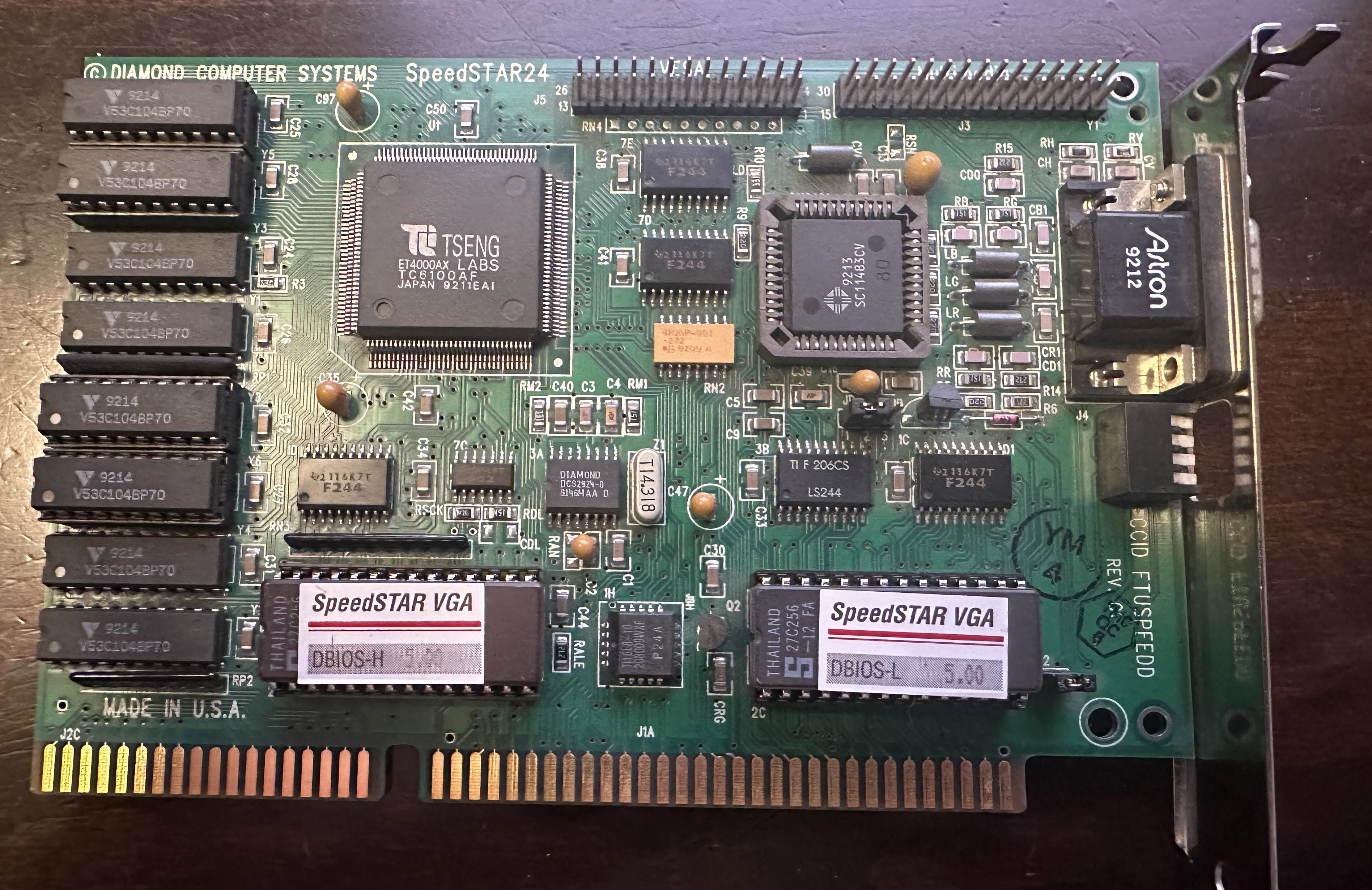Diamond SpeedSTAR 24
The SpeedSTAR 24 was released about 1 year after the SpeedSTAR and supported resolutions up to 1,280 x 1,024. The core clock ran at 65 MHz. Just as with the original SpeedSTAR, it was considered to have good VGA performance for the 2D era.
 |
Released | Early 1992 |
| Bus | ISA 16-bit | |
| Chipset | Tseng Labs ET4000AX | |
| Standards | Hercules, CGA, EGA, VGA | |
| Memory | 1 MB DRAM (60ns or 70ns) | |
| Ports | 15-pin DSUB (video out) 26-pin VGA Feature connector |
|
| RAMDAC | ||
| Part # | ||
| FCC ID | FTUSPEEDC, FTUSPEEDD | |
| Price | Feb 1993: $129-$149 | |
| See Also | SpeedSTAR |
The SpeedSTAR 24 shipped with a variety of RAMDACs:
- Music Semiconductor TR9C1710 or Samsung KDA0476PL - 8-bit colour depths (256 colours max)
- Sierra Semiconductor SC11483CV- "HiColor" 15-bit colour depth (sometimes called TARGA video mode)
- Diamond SS2410 - "TrueColor" 24-bit colour depth (sometimes called XGA video mode)
It is believed that the video BIOS versions are designed to work with any of the above RAMDACs, with presumably some detection code to set the modes accordingly. Bear in mind, however, that older BIOS versions may not support some higher colour depths. Additionally, Diamond's VESA mode utility, VMODE, only supports 8-bit colour depths so I recommend you use UNIVBE instead.
SpeedSTAR 24 owners could also buy and fit the optional Diamond TVGA Multimedia Option Card to the Multimedia Connector (top-right of the card next to the faceplate) which provided professional-level NTSC and PAL video signals.
One of my visitors, Chris Martin, tested both his SpeedSTAR 24 (see image below) and SpeedSTAR 24X on a Vendex 888-XT to see if they work in an 8-bit ISA slot. His findings indicate that the SpeedSTAR 24 *does* work in his XT machine, but the SpeedSTAR 24X does not. The SpeedSTAR 24 has jumper pins on JP1 (just below the RAMDAC chip), and setting these to 1-2 enabled puts the cards into what's called 'normal bus timing' (2-3 means 'alternate bus timing'). The IRQ2 jumper was also enabled, and the card's four DIP switches were all 'ON'. He also used FASTBIOS.SYS which made text modes faster.
Board Revisions
Just one board revision is known for the SpeedStar 24, which is C1.
Competition
In the Media
Setting it Up
The SpeedSTAR 24's DIP switches translate as follows:
| SW1 | Reserved |
|---|---|
| SW2 | Turbo/Normal display memory (ON=Turbo (16-bit ISA slot only), OFF=Normal) |
| SW3 | 16-bit/8-bit BIOS access (ON=16-bit, OFF=8-bit) |
| SW4 | Turbo/Normal BIOS access (ON=Turbo, OFF=Normal) |
Downloads
Operation Manual The original user manual for the Diamond SpeedSTAR 24. |
Original Utility Disk Get in touch if you can provide this missing item! |
|
Video BIOS ROM Courtesy of Vogons user Baoran. |
Video BIOS ROM Courtesy of Vogons user Baoran. |
Video BIOS ROM Courtesy of Vogons user Imi. |
Windows 3.1 Drivers Windows 3.1 display drivers with support for up to 1280x1024 in 16 colours, 1024x768 in 256 colours, and 800x600 in 65536 colours. |
|
More Pictures
